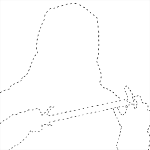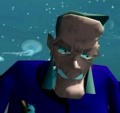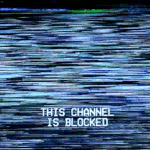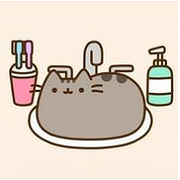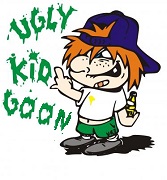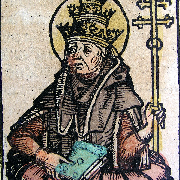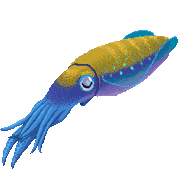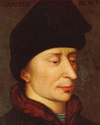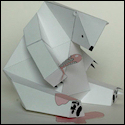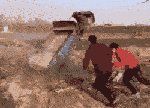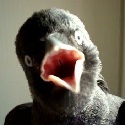|
https://twitter.com/derspiegel/status/1579843912323461120 Spiegel reports an IRIS-T delivery for Ukraine.
|
|
|
|
|

|
| # ? Apr 26, 2024 09:42 |
|
Zudgemud posted:Since Ukraine has conscription these four weeks might also be a refresher to remind them of what they did during their mandatory service which is often 6-12 months I think.
|
|
|
|
Phlegmish posted:Update on the frontline situation - according to War Mapper, no notable changes to control occurred yesterday. Once you have severed the last major supply route, the best thing to do is sit back and wait for them to chew through what supplies they have left. A few well placed HIMARS will speed up the process, but I don't expect any pushes until the Russians have finished softening themselves up a bit more.
|
|
|
|
By comparison, the training program being run out of the UK, Operation Interflex, was originally three weeks but is now five. 5,000 had finished training by mid September. I assume five weeks of that are significantly more effective than those described.
|
|
|
|
PederP posted:In the context of discussing the naming of Ukraine, it's a bit funny to casually pick a Russian revisionist/nationalist stance on the etymology of Russia - instead of the mainstream etymology which has an old norse origin (referring to Swedes who settled as the ruling class of what became Russia). I know you're very much not a nationalist, so I'm actually a bit baffled by this. (I also recognize that the refusal to acknowledge the norse historical link is not unique to Russian nationalists, but is very much a thing among some Ukrainian nationalists too). It's norse via finnic. You're right though, its the finnic word for Swedes, which is based on the norse word for rowers, boat folk. Don't see how that's nationalist quote:Rus' is generally considered to be a borrowing from Finnic Ruotsi ("Sweden").[2][3][4] There are two theories behind the origin of Rus'/Ruotsi, which are not mutually exclusive. It is either derived more directly from OEN rōþer (OWN róðr[5]), which referred to rowing, the fleet levy, etc., or it is derived from this term through Rōþin, an older name for the Swedish coastal region Roslagen.[2][3][6][7] FishBulbia fucked around with this message at 17:40 on Oct 11, 2022 |
|
|
|
Deteriorata posted:A little Googling suggests it's called the Delrey. An upscale residential/commercial building still under construction. Thanks. I would definitely not want to be responsible for all the landscaping.
|
|
|
|
cinci zoo sniper posted:The traditionalist interpretation of the etymology, yes. There’s an alternative early 20th century etymology take as well, however, that posits that “oukraina” means a specific territory, in distinction from “okraina” meaning a borderland, e.g., http://litopys.org.ua/pivtorak/pivt.htm - though given the early 20th century history of Ukraine, this etymological take could be argued against as an attempt of revisionism. Sources I've seen attribute this claim to "Samuil Grondsky", a Polish historian from the mid-1600s, stating that that word had that specific meaning in Polish (as the Polish-Lithuanian Commonwealth controlled the entire region, including Ukraine, with the ruling class of people and the administrative language both being Polish). That is, that "Ukraine" referred to roughly the same geographic area as "Ukraine" today, rather than to any generic "frontier" along the border of the PLC. Apparently that's referring to this dude (with versions of that article in Ukrainian and Russian, but not English). And that leads to this digital library copy of his 1672 work (published 1789) History of the Cossack-Polish War. Or, uh, Historia Bello Colacco-Polonicci, because it's in Latin. I found this section: quote:Postmodum, qui inhabitant tractum illum cis Borysthenem, versus Palatinatum Bratslaviensem & Podoliensem, incipiendo inferius a Civitate Rasskoro, sita ad ripam fluvii Dniestri, Latine autem Tyræ, intra alium fluvium, dictum Russice Boh, Latine autem Hippanis, & rursus circa Ladyryn, Hubnie, Nimiroro, Winnica, Chroastoro, Pawotz, Maslorostaro, Machoroka, Trilely, Humany, Kalnik, Manasterzysscze, Czehryn, Sambotorv, Wasilkorv &c. usque ad Albam Russiam, (cujus pars attingit Borysthenem, pars autem extendit se se ferme ad Moscoviam) & ad Polesie, quod ab Alba Russia procedendo, attingit Wolhiniam, & altera parte usque ipsam Lithvaniam vocantur Ukrainscii: sic dicti ideo, quod degant in iis Provinciis, quæ sunt sitæ, quasi ad marginem Regni Poloniæ, respectu aliorum regnorum, utpote Valachia, quam dislimitac Tyras, & camporum defertorum verfus ditiones Tataricas. Margo enim Polonice Kray: inde Ukrajna, quasi Provincia ad fines Regni posita, antiquitus quidem inhabitata, sed postmodum multis Civitatibus ac pagis aucta. Inter hos Cosaccos, jam plures, quam trans Borysthenem reperiuntur equites, qui, Tataris Ditiones suas invadentibus mascule resistebant, & si sorsan illis minus vigilantibus per loca sive campos defertos in partes Podoliæ & Russia irruptionem fecissent, redeuntes folebant egregie retundere, & prædam eripere. Quia veso ifti, omnes recensiti Cosacci, ceu aliquis liber populus, aut miles voluntarius, non semper jussa Regis exequi voluerunt, propterea tempore Stephani Bathorei Regis Poloniæ, ex confilio ejusdem, (qui postquam cognovisset, quam multa adhuc in partibus Ukrajnæ reperiantur inhabitata loca, & quam populosa sic gens illa Russorum, in territoriis Magnatum degentium, suasit, ut ad formam militia Hungarice versus confinia Turcica habitantis, qui Haydones dicuntur, Domini terrettres subditorum suorum filiis, qui complures apud eundem Patrem reperiebantur, darent facultatem uni illorum, exeundi ex possessione sua, ad fervitia Regni subeunda; quod si etiam in bonis Domini fui manserit, dummodo arma tractet, & quoties jussum fuerit a fupremo Generali Exercituum Regni immunitas ei ab omnibus servitiis Domini fui, præsertim ab agiestibus laboribus concedatur), novum Cosaccorum genus est ad inventum, nimirum Rejestrorvi Kozacy, hoc est, in computum seu regestrum recepti, & Regimini Generalis Exercituum Regni subjecti. Google translate says: quote:Afterward, those who inhabit that tract beyond Borysthenes, towards the Palatinate of Bratslav and Podolia, beginning below from the City of Rasskoro, situated on the bank of the river Dniester, but in Latin Tyræ, within another river, called in Russian Boh, but in Latin Hippanis, and again near Ladyryn, Hubnie, Nimiroro, Winnica, Chroastoro, Pawotz, Maslorostaro, Machoroka, Trilely, Humany, Kalnik, Manasterzysscze, Czehryn, Sambotorv, Wasilkorv etc. as far as White Russia, (a part of which reaches Borysthenes, and a part extends itself almost to Moscow) and to Polesia, which, proceeding from White Russia, reaches Wolhinia, and on the other side as far as Lithuania itself, they are called Ukrainscii: so called because they dwell in them The provinces which are situated, as it were, on the edge of the Kingdom of Poland, with respect to other kingdoms, such as Wallachia, which borders Tyra, and the plains carried towards the Tartaric dominions. For the margin of the Polonice Kray: hence Ukraina, as a Province placed at the borders of the Kingdom, anciently indeed inhabited, but afterwards enlarged by many States and villages. Among these Cossacks, already more than across the Borysthenes, are found horsemen, who resisted manfully the invaders of their territories of the Tartars, and if by chance they had made an incursion into the parts of Podolia and Russia, with less vigilance being carried by them through places or plains, they were fond of repulsing them brilliantly on their return, and rescuing the booty. Because you have seen, all the listed Cossacks, whether they were free people or volunteer soldiers, did not always want to carry out the King's commands, therefore in the time of Stephen Bathory, King of Poland, from the same tribe (who, after he had learned how many inhabited places were still to be found in the parts of the Ukraine, and how populous was that nation of the Russians, who lived in the territories of the Magnates, so that, as a form of military service in Hungary towards the Turkish borders, the inhabitants, who are called the Haydons, persuaded the Lord's terrors to the sons of their subjects, who were several with the same Father, to give one of them the ability to leave their possession his own, subjecting himself to the fervor of the Kingdom; that if he remained in the possessions of the Lord, as long as he carried arms, and whenever it was ordered by the supreme general of the Armies of the Kingdom that he should be granted immunity from all the services of the Lord, especially from the labors of the Lord), a new race of Cossacks is to be found , of course Rejestrorvi Kozacy, that is, received into the audit or registry, and of the General Government Subject to the armies of the Kingdom. I don't know how accurate a translation this is—the last half seems especially iffy—but apparently, according to this mid-1600s Polish writer, "Ukraine" was already being used to refer to that specific southeastern region of the PLC, and "Ukrainian" to that local people who lived there.
|
|
|
|
OzyMandrill posted:Once you have severed the last major supply route, the best thing to do is sit back and wait for them to chew through what supplies they have left. A few well placed HIMARS will speed up the process, but I don't expect any pushes until the Russians have finished softening themselves up a bit more. I just want Biden to send some atacms over. The few remaining major supply routes are there, just out of reach of himars. It's so tantalizing, but the Americans seem deathly afraid of "escalating the situation", which is ridiculous.
|
|
|
|
FishBulbia posted:It's norse via finnic. You're right though, its the finnic word for Swedes, which is based on the norse word for rowers, boat folk. Don't see how that's nationalist Well, the norse heritage is disputed by some Russian (and Ukrainian) nationalists. For example, the ethnicity and culture of some of the Kievan Rus royalty is a touchy subject for some. Not that culture, ethnicity and language in those days were as neatly defined as many today would like to think. But still historical periods of (full or partial) rule by a class of foreign origin isn't something that nationalists (and I know that's not you) like to acknowledge. I've met (online and in real-life) Russians and Ukranians would did not accept that the Rus were of Swedish origin, and thought of it as anti-slavic propaganda. This isn't unique to Russian nationalists - there are plenty of European royalists and nationalists who have a very selective interpretation of the history of the various royal families. But as I said, I know you're not a nationalist, and I hope you didn't take my small jab as an accusation of such. I was just amused by the coincidence of the etymological comparisons, as both relate to nationalist narratives, but in somewhat opposed ways. Anyway, I'm sure we can agree that nationalists are wont to be selective and hypocritical about history and etymology in order to support their personal narratives. And this is why I think it is important to respect when the preferred grammar/spelling of a people/country. Even if it is awkward and annoying - which is how I initially felt about spelling Ukrainian toponyms differently than I was used to. Why should it matter? I meant no harm by spelling them as they used to be. But it does matter. And I think that goes for avoiding 'the' Ukraine as well. It is probably doubly awkward for passionate internationalists to pay heed to sensitivities regarding the linguistics of nation-state monikers. Still, it should be worth it to not support the narrative of imperialists and irredentist nationalists.
|
|
|
|
uXs posted:I'm also Dutch-speaking, but from Belgium, and "de Oekraïne" doesn't sound that wrong to me. Phlegmish posted:I am also Flemish, and I would never say "de Oekraïne". I'd definitely raise my eyebrows if I heard that. Wondering if it's a regional thing, steamed hams style Agricola Frigidus posted:So am I, but it does. Don't think there's any country with an article without an explicit koninkrijk/kingdom or republiek/republic in the name (and even then you'd need to be dragging it out to "the islamic republic of Iran" or "the Russian kleptocracy"). I think we've all had different experiences. I had a very boomer geography teacher (late '90s) who did consistently say "de Oekraïne". Note that one of the reasons him saying that stuck with me is because even by the late '90s, it felt archaic and a relic from the Cold War.
|
|
|
|
Deltasquid posted:It’s interesting because in Dutch, “de Oekraïne” would never work, This is completely incorrect, I don't know where you got this idea but "De Oekraïne" was the Dutch name until the 1991 independence. Many older people still slip up sometimes and call it that. It's very much a generational thing but it's very wrong to claim that it's grammatically incorrect.
|
|
|
|
Pablo Bluth posted:By comparison, the training program being run out of the UK, Operation Interflex, was originally three weeks but is now five. 5,000 had finished training by mid September. I assume five weeks of that are significantly more effective than those described. I also wonder if this gives the Ukrainian Army sometime to rest and secure the places they liberated a bit more.
|
|
|
|
Paladinus posted:Fun fact. The reason why Great Britain is great is that Ireland, the smaller of the two major British isles, used to be referred to as Little Britain. Suffice to say, calling an Irish person a Little Brit wouldn't fly today. Ironically, Wales is now called Little Britain in Irish. I would like to say this post is mostly nonsense.
|
|
|
|
spankmeister posted:This is completely incorrect, I don't know where you got this idea but "De Oekraïne" was the Dutch name until the 1991 independence. Many older people still slip up sometimes and call it that. I’m Flemish and Agricola Frigidus posted:So am I, but it does. Don't think there's any country with an article without an explicit koninkrijk/kingdom or republiek/republic in the name (and even then you'd need to be dragging it out to "the islamic republic of Iran" or "the Russian kleptocracy"). Phlegmish posted:Update on the frontline situation - according to War Mapper, no notable changes to control occurred yesterday. Calling it “De Oekraïne” sounds about as correct as “het Frankrijk” or “het Duitsland” or “het Schotland”. Although this might indeed be because we don’t call nation-states like that, but we do it with substates (eg de Limburg).
|
|
|
|
Deltasquid posted:I’m Flemish and quote:Calling it “De Oekraïne” sounds about as correct as “het Frankrijk” or “het Duitsland” or “het Schotland”. Although this might indeed be because we don’t call nation-states like that, but we do it with substates (eg de Limburg). You said that de Oekraïne "would never work grammatically", and that's just wrong to say. Before Ukraine regained independence in 1991 it was considered to be a geographical area of the USSR. Geographical areas can be referred to using "de" or "het" in Dutch. (There is no difference between Netherlands and Flanders Dutch in this at all!) As such, "de Oekraïne" was absolutely correct (grammatically speaking) before 1991, just as "de Ardennen" or "de Biesbosch" or "de Tweede Maasvlakte". Many people who grew up before Ukraine's independence learned to refer to it as "de Oekraïne" and were absolutely fine with it. I myself grew up calling it just "Oekraïne" like we should, and to me "de Oekraïne" sounds strange too! But "it would never work" is wrong, because it did.
|
|
|
|
Imo interestingly in German it's often still "Die Ukraine". Get with the times, Germany!
|
|
|
|
Flemish here too. "De Oekraïne" sounds weird to me too, but this website, albeit from Nederland, shows it was used and that it did work before: https://onzetaal.nl/taalloket/oekraine-de-oekraine. "Den Oekraïne" would sound less weird to me, incidentally.
|
|
|
|
This has been an interesting little derail, and I was not expecting to learn about my own language in the Ukraine thread. If it's a generational thing, that makes a lot of sense. I was born in 1990, so it was already being phased out when I was growing up. I don't think I've ever heard anyone say 'de Oekraïne', but then again Ukraine was never really a common topic of conversation until recently.
|
|
|
|
spankmeister posted:Imo interestingly in German it's often still "Die Ukraine". Get with the times, Germany! It's also die Niederlande, die Türkei, die Mongolei and die Schweiz. A cunning linguist could probably point out why this is, but in any case I wouldn't count on it changing soon.
|
|
|
|
Yeah, it only works as a shibboleth to filter out lovely people if your language doesn't habitually use a definite article to refer to independent countries, as is the case for English and Dutch. I imagine that Die Ukraine is just fine in German.
|
|
|
|
spankmeister posted:Imo interestingly in German it's often still "Die Ukraine". This is also why Putin has "die Ukraine, die" tattooed on his chest, from his time in East Germany.
|
|
|
|
Phlegmish posted:This has been an interesting little derail, and I was not expecting to learn about my own language in the Ukraine thread. If it's a generational thing, that makes a lot of sense. I was born in 1990, so it was already being phased out when I was growing up. I don't think I've ever heard anyone say 'de Oekraïne', but then again Ukraine was never really a common topic of conversation until recently. '77 so yeah, probably an age thing. I would never say it like this now, it just doesn't sound totally weird to me.
|
|
|
|
Deltasquid posted:I guess the English equivalent would be like calling it “the Ukraine” instead of just “Ukraine” ? I mean, we do often use the terms "The US", "The United States", "The UK", or "The United Kingdom" but I don't think anyone is going to imply we consider them part of another country.
|
|
|
Small White Dragon posted:I mean, we do often use the terms "The US", "The United States", "The UK", or "The United Kingdom" but I don't think anyone is going to imply we consider them part of another country. The reason for that use of the definite article is an adjective preceding the noun.
|
|
|
|
|
If the west coast of the US became independent, 600 years past, and people still referred to it as "The West Coast" it would definitely be seen as a political statement. It's as loaded as terms like the "near east"
|
|
|
|
Kikas posted:Hell, this has spread to other nations - Poland has a lot of "rusycyzmy" which is to say russian-based/inspired words or phrases, or other parts of language. However, there is a great push now against one thing I never considered. We used to say "na Białorusi" and "na Ukrainie", and now people are moving towards "w Ukrainie". Thats good. I'm pretty sure Lithuanians here as well as Belarusians and Ukranians will appreciate awareness that the Rzeczpospolita of old was a commonwealth of peoples, not just Poland. Saying "you guys were just a part of Poland" isn't much different from Russian imperialism.
|
|
|
|
My guiding principle on this point is that many Ukrainians have said that referring to their country in any way as "The Ukraine", rather than simply "Ukraine" is a thing which undermines their status as an independent nation, and I think they know a hell of a lot about that than I do, so I will defer to their expertise.
|
|
|
|
Sereri posted:It's also die Niederlande, die Türkei, die Mongolei and die Schweiz. A cunning linguist could probably point out why this is, but in any case I wouldn't count on it changing soon. I honestly have no idea why that is, but dropping the article feels unnatural due to habitual use. Hell, I didn't even know anything about Ukraine in till a decade or so ago. Looking it up it seems to be more a about the traditional gender of the country. https://at.galileo.tv/life/laender-artikel-der-die-das-welche-staaten-haben-keine-artikel/ So it's Die Ukraine and Der Jemen. I guess this means traditionally Ukrainians regarded their country as female, or at least the German perception came across that way. I guess nowadays that gendering would cause other controversies. In any way it's absolutely not a Russian shiboleh in that case. Nenonen posted:This is also why Putin has "die Ukraine, die" tattooed on his chest, from his time in East Germany. I appreciate that historically accurate joke.
|
|
|
|

|
| # ? Apr 26, 2024 09:42 |
Deltasquid posted:I’m Flemish and spankmeister posted:I never assumed anything about your nationality because it's not relevant to this argument. Phlegmish posted:This has been an interesting little derail, and I was not expecting to learn about my own language in the Ukraine thread. If it's a generational thing, that makes a lot of sense. I was born in 1990, so it was already being phased out when I was growing up. I don't think I've ever heard anyone say 'de Oekraïne', but then again Ukraine was never really a common topic of conversation until recently. Besluit de draad verwachtend naar per Hollands spraak taal het spoor bijster raken. Heilige geslachtsgemeenschap hebben poep. p.s. The new thread is up - https://forums.somethingawful.com/showthread.php?threadid=4014579
|
|
|
|






